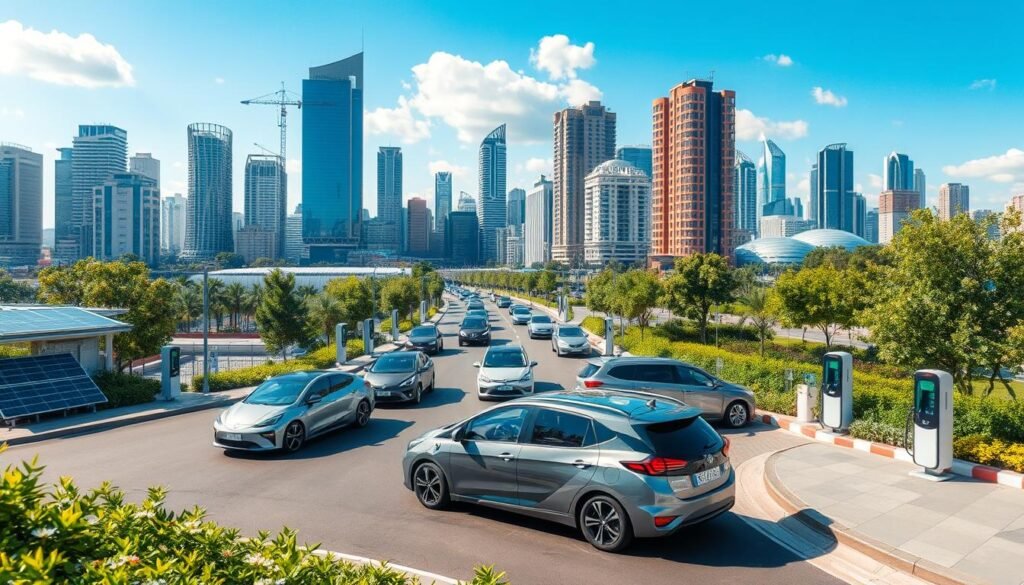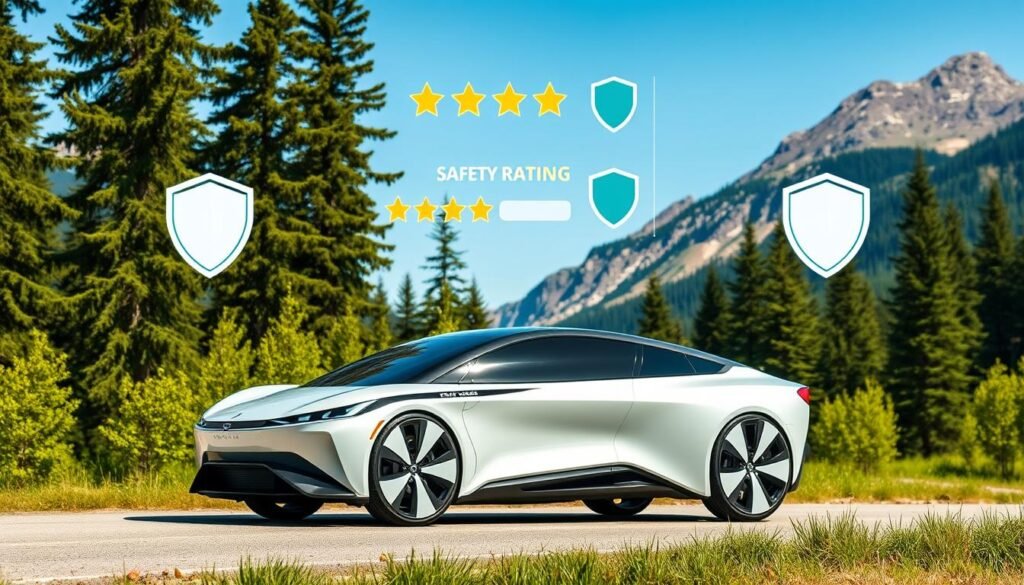Did you know that hybrid vehicles can reduce greenhouse gas emissions by up to 40% compared to traditional gasoline cars? As Canada grapples with environmental challenges and strives for a sustainable future, the appeal of eco-friendly hybrid vehicles is on the rise. These cutting-edge green cars merge electric and gasoline power, presenting a viable option for those who prioritize environmental responsibility. This guide delves into the escalating importance of hybrid vehicles in fostering sustainable transportation. It examines their advantages, prominent models, government incentives, and the prospects for this technology’s advancement.
Key Takeaways
- Hybrid vehicles significantly cut down greenhouse gas emissions.
- They provide an excellent alternative to conventional gasoline-powered cars.
- Government incentives in Canada support the adoption of eco-friendly hybrid vehicles.
- These vehicles offer great fuel efficiency, leading to substantial cost savings.
- As technology evolves, hybrid vehicles continue to grow in popularity and innovation.
What Are Eco-Friendly Hybrid Vehicles?
Eco-friendly hybrid vehicles mark a significant leap in automotive technology. They combine the efficiency of a gasoline engine with the advantages of an electric motor. This innovative approach to environmentally friendly transportation minimizes emissions and optimizes fuel consumption. Understanding the components and operation of these vehicles provides insight into their growing popularity among drivers seeking sustainable options.
Definition and Explanation
Eco-friendly hybrid vehicles utilize both a gasoline engine and an electric motor to provide a cleaner, more efficient mode of transportation. The term “hybrid” indicates the use of multiple power sources. This enables the vehicle to switch between or combine engines to achieve optimal performance. The integration of this hybrid car technology significantly reduces fuel consumption and greenhouse gas emissions. It makes it a preferred choice for environmentally conscious consumers.
Key Components of Hybrid Vehicles
Several critical components work together to make eco-friendly hybrid vehicles operational:
- Gasoline Engine: The traditional engine provides power for acceleration and long distances.
- Electric Motor: This motor assists with propulsion, especially at lower speeds, thereby enhancing fuel efficiency.
- Battery Pack: Stores energy generated from regenerative braking and powers the electric motor.
- Regenerative Braking System: Captures energy during braking and repurposes it to recharge the battery, minimizing waste.
Benefits of Choosing Hybrid Vehicles
Choosing eco-friendly hybrid vehicles offers numerous advantages, appealing to those who value environmental sustainability and cost-effective transportation. This shift towards hybrids supports sustainable practices and enhances driving experiences.
Environmental Impact
Hybrid vehicles significantly reduce harmful emissions compared to traditional cars. Studies show that using these vehicles can decrease pollutants and CO2 emissions. This leads to cleaner air and a healthier planet.
Fuel Efficiency
Hybrids are renowned for their fuel efficiency. They combine electric power with gasoline engines, optimizing fuel use. Many drivers experience a notable decrease in fuel consumption, resulting in fewer trips to the gas station and lower costs over time.
Cost Savings
Hybrid vehicles offer substantial financial benefits. Lower fuel consumption translates to significant savings on fuel costs over the vehicle’s lifespan. Moreover, various incentives are available for those investing in hybrid technology, making these choices even more attractive.
Popular Eco-Friendly Hybrid Vehicles in Canada
Exploring the realm of eco-friendly hybrid vehicles in Canada reveals a plethora of top-tier options. These vehicles embody sustainability and serve as practical solutions for daily commutes. Below, we highlight several models that stand out as exemplary eco-friendly automotive choices.
Toyota Prius
The Toyota Prius has consistently led the hybrid market. Renowned for its dependability and superior fuel efficiency, it remains a preferred choice for those prioritizing the environment. The Prius boasts a spacious interior and cutting-edge technology, solidifying its status as a comprehensive eco-friendly option.
Honda Insight
The Honda Insight is distinguished by its elegant design and advanced technology. It seamlessly blends practicality with style, positioning itself as a leading eco-friendly hybrid. Its performance and fuel efficiency further solidify its position as a premier eco-friendly automotive choice.
Ford Escape Hybrid
The Ford Escape Hybrid merges the versatility of an SUV with eco-friendly performance. It offers ample space for families and their belongings, coupled with reliable fuel economy. This combination of functionality and sustainability positions the Ford Escape Hybrid as a compelling option among popular eco-friendly hybrid vehicles.
Government Incentives for Hybrid Vehicles in Canada
In Canada, the government offers incentives to promote the adoption of hybrid vehicles. These incentives make eco-friendly choices more accessible. Understanding these incentives can enhance awareness of the hybrid vehicle benefits and significantly reduce the financial burden of purchasing a new vehicle.
Federal Incentives
The Canadian federal government supports buyers of hybrid vehicles through several programs. These include rebates and tax credits that can lower the upfront cost. For detailed information, potential buyers can visit the federal incentives page. This financial support underscores the government’s commitment to environmentally friendly transportation options.
Provincial Incentives
Provinces in Canada also offer their own programs to complement national efforts. These incentives may include additional rebates, access to carpool lanes, or discounts on registration fees. Each province varies in its offerings, allowing residents to benefit from localized support for hybrid vehicles. Exploring provincial options can maximize the hybrid vehicle benefits and ensure buyers take full advantage of available financial programs.
How Hybrid Vehicles Work
Understanding the mechanics behind hybrid vehicles is crucial for appreciating their advantages. These vehicles combine gasoline engines with electric power sources, aiming to boost fuel efficiency and performance. By examining the various hybrid types, one can uncover how this technology improves the driving experience.
Types of Hybrid Vehicles
There are several hybrid vehicle types, each designed to meet different needs and preferences:
- Full Hybrids: These can run solely on the electric motor, the gasoline engine, or both, offering flexibility.
- Mild Hybrids: They assist the gasoline engine with an electric motor, enhancing performance but not running solely on electricity.
- Plug-in Hybrids: Featuring larger batteries, these can be charged from an outlet, enabling longer electric-only drives.
Battery and Fuel Efficiency
The battery system is pivotal in hybrid vehicles’ efficiency. It powers the electric motor and recharges during driving, either through regenerative braking or the gasoline engine. This innovation significantly reduces fuel consumption, making hybrids an attractive option for those aiming to lower their environmental impact. The combination of enhanced fuel efficiency and a versatile power source allows for sustainable travel without compromising on performance.
The Future of Hybrid Technology

The automotive sector is poised for groundbreaking advancements in hybrid technology. New innovations are set to redefine eco-friendly driving, positioning hybrids as a sustainable option for the future. Observing consumer trends reveals a growing preference for environmentally friendly vehicles, driven by heightened climate change awareness.
Innovations on the Horizon
Several breakthroughs are anticipated to elevate hybrid technology, concentrating on critical areas such as:
- Next-generation battery systems enabling quicker charging and extended lifespan.
- Enhanced fuel efficiency through cutting-edge engineering techniques.
- Artificial intelligence integration to refine driving patterns for superior energy management.
Consumer Trends
As the industry progresses, consumer trends are shifting towards hybrid and electric vehicles. Environmental concerns and the increasing cost of traditional fuel are driving this shift. Studies indicate a significant increase in consumer prioritization of sustainability in their purchasing choices. In response, manufacturers are expanding their hybrid offerings, meeting the evolving demands of contemporary drivers. For a detailed exploration of these trends, refer to this comprehensive article.
Environmental Impact of Hybrid Vehicles
Eco-friendly hybrid vehicles significantly reduce the environmental impact of transportation. Their innovative design and technology diminish reliance on traditional fossil fuels, leading to a cleaner future. We will delve into two key aspects of hybrids: their role in lowering greenhouse gas emissions and enhancing energy conservation.
Reduction of Greenhouse Gas Emissions
Hybrid vehicles are crucial in reducing greenhouse gas emissions. They combine gasoline engines with electric motors, using less fuel and providing ample power. This results in a decrease in carbon dioxide and other harmful emissions. A reduced dependency on fossil fuels improves air quality and fosters a healthier environment.
Energy Conservation
Hybrids also excel in energy conservation. Their efficient fuel usage allows for longer trips on fewer resources. Additionally, many hybrids utilize electric power, which can be generated from renewable sources. This synergy supports sustainable energy use, promoting a more responsible travel approach.
Hybrid vs. Electric Vehicles: Which to Choose?
Choosing between hybrid and electric vehicles involves considering several factors. Each type offers unique advantages and disadvantages, catering to different needs and lifestyles. As the demand for sustainable transportation grows, both options present distinct benefits and challenges.
Pros and Cons of Each
Both hybrid and electric vehicles have their own set of pros and cons:
- Hybrid Vehicles:
- Pros: They offer a longer driving range, thanks to their combined gas and electric engines, making long trips possible.
- Cons: They are generally less environmentally friendly than electric vehicles, as they emit pollutants from gasoline engines.
- Electric Vehicles:
- Pros: They have zero tailpipe emissions, making them a greener choice for sustainable transportation.
- Cons: Their range is limited in some models, and they rely on charging infrastructure, which may not be as widespread as gas stations.
Ideal Use Cases
The choice between hybrid and electric vehicles often hinges on driving habits:
- Hybrid Vehicles: They are best for those who frequently take long road trips and value the flexibility of a gas backup.
- Electric Vehicles: They are ideal for city residents with short daily commutes, where charging stations are readily available.
Financing Options for Eco-Friendly Hybrid Vehicles

Exploring financing options for eco-friendly hybrid vehicles significantly impacts your purchasing decision. Consumers often weigh the benefits of leasing versus buying, considering their financial commitments. Each approach offers unique advantages that can affect overall budget and flexibility.
Leasing vs. Buying
Leasing eco-friendly hybrid vehicles typically involves lower monthly payments. It allows drivers to enjoy new models every few years. This option is ideal for those who prefer the flexibility of changing their vehicle regularly.
On the other hand, buying a hybrid vehicle offers ownership benefits. The car becomes an asset that can increase in value over time. Buyers can also customize their vehicles to fit personal preferences.
When considering financing options, evaluating long-term financial health is crucial. For some, buying might prove more economical in the long run. This is especially true for eco-friendly vehicles that retain value better due to their increasing demand.
Government Grants and Rebates
To support the transition to eco-friendly hybrid vehicles, various government grants and rebates are available across Canada. These incentives can significantly reduce the overall cost, making it easier for consumers to choose green driving solutions. Programs such as the federal electric vehicle subsidy encourage residents to invest in sustainable options.
For tailored support, exploring local initiatives can yield additional opportunities. Check out this responsible finance products for more information on financing options and incentives.
With these various financing options available, prospective buyers can adapt their choices based on personal financial situations and preferences. Understanding these facets ensures making informed decisions in the eco-friendly hybrid vehicle market.
Maintenance of Hybrid Vehicles
Ensuring the longevity and efficiency of eco-friendly hybrid vehicles necessitates specific maintenance practices. These practices are tailored to their unique components. Regular upkeep maximizes performance and preserves the benefits of hybrid technology. Understanding the common maintenance needs is essential for all owners.
Common Maintenance Needs
Hybrid vehicle maintenance typically includes several important tasks:
- Battery Health Checks: Regular assessment of the hybrid battery’s condition is crucial.
- Fluid Levels: Checking and replacing coolant, oil, and brake fluids help maintain optimal performance.
- Tire Maintenance: Ensuring tires are properly inflated and rotated promotes efficiency and safety.
- Brakes Inspection: Specialized brake systems in hybrids may require unique attention to maximize lifespan.
- Software Updates: Keeping the vehicle’s software updated can enhance performance and efficiency.
Specialists for Hybrid Maintenance
Seeking out specialists with experience in hybrid technology can significantly affect the maintenance process. Trained professionals understand the intricacies of hybrid systems better than general mechanics. Locating a shop that specializes in hybrid vehicle maintenance ensures your eco-friendly hybrid vehicles receive the appropriate care. This leads to enhanced reliability and performance.
Test Driving a Hybrid Vehicle
Preparation is key when test driving hybrids. By gaining knowledge beforehand, you can fully appreciate the eco-friendly hybrid vehicles. Note how they perform on the road, focusing on comfort, handling, and technology features. These aspects significantly influence your driving experience.
What to Look For
During your test drive, consider the following elements to evaluate the hybrid:
- Comfort: Ensure that the seating and overall ergonomics of the vehicle meet your needs.
- Handling: Pay attention to how the vehicle responds during turns and while accelerating.
- Technology Features: Familiarize yourself with the infotainment system and any hybrid-specific displays.
- Noise Levels: Note how quiet the cabin is during electric mode versus gasoline mode.
Questions to Ask the Dealer
Engaging the dealer with the right questions can further enhance your understanding of the eco-friendly hybrid vehicles. Here are some crucial inquiries to make:
- What is the fuel efficiency? Get specific numbers to assess potential savings.
- What kind of warranty is offered? Understand what coverage you will have for maintenance.
- How does maintenance differ from a traditional vehicle? Gather details on unique service requirements.
- Are there any available incentives for purchasing this vehicle? Inquire about possible rebates or grants.
Hybrid Vehicle Safety Ratings

When evaluating eco-friendly hybrid vehicles, safety is paramount. Modern hybrids boast advanced safety features, designed to protect drivers and passengers. These features ensure a comprehensive safety experience.
Overview of Safety Features
Eco-friendly hybrid vehicles incorporate a range of advanced safety technologies. These include:
- Automatic Emergency Braking: This feature prevents collisions by automatically applying the brakes in potential crash scenarios.
- Lane-Keeping Assist: It alerts drivers if they drift out of their lane and offers corrective steering assistance.
- Adaptive Cruise Control: This system maintains a safe following distance by adjusting the vehicle’s speed automatically.
- Blind Spot Monitoring: It alerts drivers to vehicles in their blind spots, reducing the risk of accidents during lane changes.
Ratings from NHTSA and IIHS
Organizations such as the National Highway Traffic Safety Administration (NHTSA) and the Insurance Institute for Highway Safety (IIHS) conduct rigorous testing. They determine hybrid vehicle safety ratings, offering insights into crashworthiness and overall safety. Many hybrids receive high ratings, providing reassurance to consumers about their safety on the road.
Real Owner Experiences with Hybrid Vehicles
Delving into the realm of eco-friendly hybrid vehicles uncovers invaluable insights from real owners. Their testimonials illuminate satisfaction levels, fuel efficiency, and performance. They also address common concerns. These personal narratives serve as a compass for potential buyers, guiding them towards informed decisions.
Testimonials
Many owners of eco-friendly hybrid vehicles share their enthusiasm. Here are some common highlights:
- Exceptional fuel economy, allowing drivers to save significantly on gas.
- Quiet and smooth operation, making for a pleasant driving experience.
- Impressive acceleration, proving hybrids can perform alongside traditional vehicles.
- Positive environmental impact, contributing to reduced emissions.
These accounts demonstrate that these vehicles not only meet but often exceed expectations. They successfully blend efficiency with performance.
Common Concerns
While many experiences are positive, potential buyers should be aware of some common concerns associated with hybrid ownership:
- Higher initial purchase cost compared to traditional vehicles.
- Battery replacement costs that can arise after several years of use.
- Availability of specialized service centers for maintenance.
Addressing these concerns beforehand can help future owners prepare for their transition to eco-friendly hybrid vehicles.
Where to Buy Hybrid Vehicles in Canada
In Canada, the options for acquiring hybrid vehicles are diverse, catering to various tastes and requirements. Traditional local dealerships offer the benefit of hands-on experiences. Conversely, the rise of online retail options brings a new dimension of convenience.
Local Dealerships
Local dealerships boast an extensive selection of eco-friendly hybrid vehicles. This allows customers to personally explore different models. The advantages of local dealerships include:
- Personalized Assistance: Expert staff are available to assist throughout the purchase process.
- Test Drives: Potential buyers can test drive their preferred hybrids before purchasing.
- Immediate Availability: With in-stock options, customers can drive their new hybrid home the same day.
Online Retail Options
The advent of online platforms has transformed the hybrid vehicle shopping landscape in Canada. These platforms enable buyers to:
- Compare Models: Review and compare various hybrid models and their specifications.
- Check Prices: Access pricing information across different dealerships to secure the best deals.
- Convenience: Shop from home, enhancing the accessibility of car buying.
Tips for Maximizing Hybrid Vehicle Efficiency
To optimize your eco-friendly hybrid vehicles, adopt practical driving techniques and maintenance practices. These strategies enhance fuel efficiency, leading to a more sustainable driving experience.
Driving Techniques
Implementing specific driving habits can significantly boost hybrid efficiency. Here are some effective tips:
- Smooth acceleration and braking: Gradually increase speed and avoid sudden stops to maintain energy efficiency.
- Consistent speeds: Maintaining a steady velocity can optimize battery use and improve fuel consumption.
- Use regenerative braking: This feature converts energy lost during braking back into electricity, extending battery life.
- Plan your route: Select paths with fewer stops or traffic disruptions to maintain momentum and efficiency.
Proper Maintenance Practices
Proper upkeep of your eco-friendly hybrid vehicles ensures optimal performance. Consider these maintenance practices:
- Regularly check and maintain tire pressure for better fuel efficiency.
- Schedule consistent battery health assessments and replace components as necessary.
- Keep up with engine services, including oil changes and air filter swaps, to promote smooth operation.
- Consider evaluating your vehicle’s overall performance with professionals who can offer insights tailored to maximizing hybrid efficiency.
These small changes can lead to a more enjoyable and efficient driving experience. For those interested in upgrading their current vehicle while still maximizing hybrid efficiency, explore options available through various online platforms.
Conclusion: The Road Ahead for Eco-Friendly Driving
The evolution of the automobile industry is marked by the increasing importance of eco-friendly hybrid vehicles. These vehicles are crucial for promoting sustainable transportation in Canada. Innovations in hybrid car technology, such as enhanced battery life and improved fuel efficiency, are continually emerging. It is essential for consumers to stay abreast of these advancements.
By doing so, drivers not only benefit but also contribute to a broader commitment to environmental sustainability. This commitment is vital for a sustainable future.
Keeping Up with Trends
Following advancements in hybrid technology allows drivers to make choices that reflect their values. These choices help reduce their carbon footprint. Embracing eco-friendly driving habits and understanding the benefits of these vehicles are key to a more sustainable future.
Now is the perfect time for potential buyers to explore the various options available in the market. These options cater specifically to the growing demand for efficient and environmentally responsible transportation solutions.
Making an Informed Purchase Decision
Making a well-informed purchase decision requires evaluating available hybrid vehicles. It is crucial to understand their features and benefits. Assessing the long-term advantages, such as lower running costs and government incentives, can significantly enhance the overall value of investing in a hybrid.
To delve deeper into the future of eco-friendly transportation and make informed choices, consider reading more about the journey ahead in sustainable driving here.
FAQ
What are the main benefits of eco-friendly hybrid vehicles?
Eco-friendly hybrid vehicles offer significant advantages. They reduce greenhouse gas emissions, enhancing fuel efficiency over traditional vehicles. This leads to potential cost savings on fuel. Moreover, they provide a sustainable transportation option, contributing to environmental conservation.
How does hybrid car technology work?
Hybrid car technology combines a gasoline engine with an electric motor. This combination optimizes performance and fuel efficiency. The vehicle can switch between power sources or use both simultaneously, conserving fuel and reducing emissions.
Are there any government incentives for purchasing hybrid vehicles?
Yes, governments in Canada offer incentives for hybrid vehicle purchases. These include tax credits, rebates, and other financial benefits. These incentives aim to make eco-friendly automotive options more accessible to consumers.
What are some popular hybrid vehicles available in Canada?
In Canada, popular eco-friendly hybrid vehicles include the Toyota Prius, known for its reliability. The Honda Insight is appreciated for its design and technology. The Ford Escape Hybrid combines SUV benefits with eco-friendly performance.
What maintenance is required for hybrid vehicles?
Hybrid vehicles require regular maintenance similar to conventional cars. However, unique aspects like battery management and system checks are crucial. It’s advisable to consult specialists knowledgeable about hybrid technology for proper care and maintenance.
How do I maximize the efficiency of my hybrid vehicle?
To maximize efficiency, adopt smooth driving techniques. Gradual acceleration and consistent speeds are key. Regular maintenance of the battery system and engine is also essential for optimal performance and efficiency.
What should I look for when test driving a hybrid vehicle?
When test driving, consider comfort, handling, and technology features. It’s also important to ask about fuel efficiency, warranty services, and ongoing maintenance needs. This ensures an informed choice.
How do hybrid vehicles compare to electric vehicles?
Hybrid vehicles use both gasoline and electric power, offering a longer range and quicker refueling times than fully electric vehicles. Each option has its pros and cons, depending on individual driving habits and lifestyle.
What is the environmental impact of hybrid vehicles?
Hybrid vehicles significantly reduce greenhouse gas emissions by lowering fossil fuel reliance. They promote energy conservation through efficient fuel usage. The potential to utilize electric power from renewable energy sources helps mitigate climate change.
